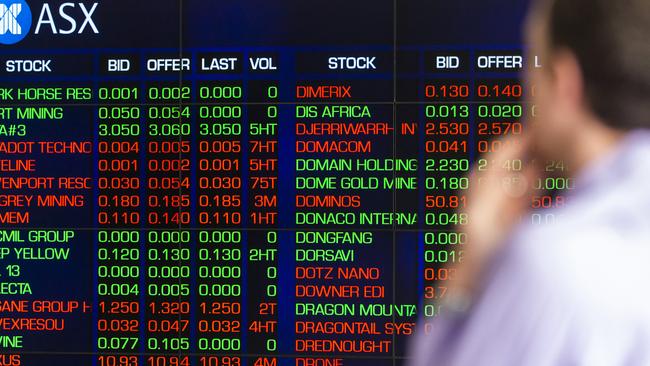Investors wipe $50bn from sharemarket amid fears over US inflation, Chinese Covid-19 spread
Miners bore the brunt of the sell-off in the local sharemarket’s worst day since Russia invaded Ukraine.

Investors wiped $50bn off Australian shares after jitters about US interest rates and a resurgence of Covid-19 in China triggered sharp falls in global equities and commodities markets, notwithstanding a rebound in regional markets as the People’s Bank of China offered to provide policy support.
In its worst day since Russia’s invasion of Ukraine two months ago, Australia’s S&P/ASX 200 share index closed down 155.3 points or 2.1 per cent at 7318 points.
The index fell as much as 2.4 per cent to a five-week low of 7290.8 in early trading.
For the first time in two months the index closed below its 200-day moving average, recently near 7350 – also threatened additional chart support from its 50 and 100-day averages around 7300.
Share trading value was almost 50 per cent above normal levels.
“Value was huge as institutional investors were forced to trade,” said Bell Potter’s head of institutional sales and trading, Richard Coppleson, noting 63 block trades worth $789m amid total volume worth $9.8bn.
The biggest block trade was 10.8m shares in Fortescue Metals handled by Goldman Sachs, as institutional investors adjusted their positions in response to a recent downturn in commodities.
The top five drags on the market came from the Materials and Energy sectors.
BHP fell 5.8 per cent, Fortescue Metals dropped 6.9 per cent, Rio Tinto tumbled 4.3 per cent, South32 fell 7.9 per cent and Woodside Petroleum dived 4.6 per cent. However, commodity prices recovered in Tuesday’s Asian session after recent falls.
Singapore iron ore futures rose 2 per cent to $US138.90 a tonne, Brent crude oil futures rose 0.5 per cent to $US102.86 a barrel and Comex copper rose 0.5 per cent.
The share markets’ five worst performers were EML Payments, down 39 per cent on a profit warning, and Materials companies – including Mineral Resources, Sims Group, Champion Iron and BlueScope Steel – with that group diving up to 10 per cent.
Worst off was EML Payments, down 39 per cent on a profit warning which saw the company’s guidance for earnings before interest tax depreciation and amortisation cut about 8 per cent.
Materials companies dived about 10 per cent. Banks mostly outperformed although Commonwealth Bank dived 2.8 per cent to $105.37.
The Australian dollar briefly recovered to US72.29c before falling back to US71.85. The Aussie fell 2.7 per cent in the past three days as commodities wobbled and the US dollar rose.
Elsewhere in the Asia-Pacific region, China’s Shanghai-Shenzhen CSI 300 index revered an intraday rise to be down 0.8 per cent in late trading. Japan’s Nikkei 225 was up about 0.4 per cent, while the Hang Seng index was up 0.6 per cent and South Korea’s KOSPI index rose 0.4 per cent. “Asian markets are showing tentative signs of life today after the sell-everything move,” said Jeffrey Halley, senior market analyst Asia Pacific and OANDA.
“It looks more like a dead cat bounce than brave new world though as Beijing’s Covid-19 situation has knocked the Ukraine/Russia war, the Federal Reserve, threats of nuclear war from Russia, and even Elon Musk and Twitter off the headlines.”
China’s growth outlook has been threatened by last year’s regulatory clampdown, property developer de-leveraging and more recently the surge of Covid-19 cases, Mr Halley added.
The PBoC attempted to reassure investors after the nation’s share market dived over 5 per cent on Monday amid the threat of widespread Covid-19 lockdowns including Beijing. China’s central bank “will step up the prudent monetary policy’s support to the real economy, especially for industries and small businesses hit hard by the pandemic,” it said.
The PBoC added that it will promote healthy and stable development of financial markets and provide a good monetary and financial environment while keeping reasonably ample liquidity. On Monday it cut the amount of money that banks need to keep in reserve for their foreign currency holdings to limit a fall in the yuan.
It comes as the US earnings season fires up with tech giants Microsoft and Alphabet reporting overnight and the market braces for Wednesday’s release of March quarter CPI data which may support expectations of a large rise in interest rates.
Tuesday’s fall leaves the Australian share market down 1.7 per cent for the year to date.
It has outperformed the US market by 7.5 per cent so far this year as the Ukraine war turbocharged a resources boom started by unprecedented policy stimulus during the pandemic.
An improvement in earnings estimates and a seasonal flow of dividends from the February profit season has also helped the Australian share market in recent months.
However the May to September period is often the weakest time of year for shares.
The share market also faces risks from Wednesday’s CPI data with BetaShares chief economist David Bassanese arguing that inflation well above the RBA’s 2-3 per cent target band will motivate the central bank to follow global central banks with an initial rate hike of 15 basis points.



